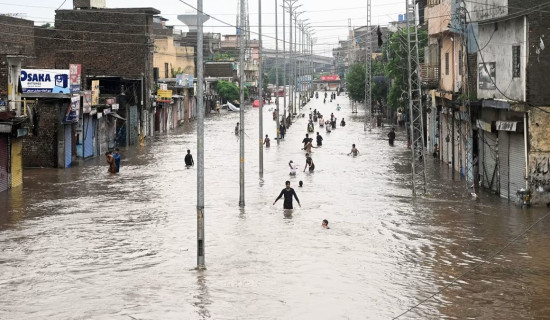- Friday, 18 July 2025
History Lives Through Reading
"History teaches us that man learns nothing from history."
The wise words from Georg Wilhelm Friedrich Hegel ring so valid for the whole of humanity, especially in this day and age of 5G technology, artificial intelligence and the internet of things that offers the human race a rarest of the rare opportunity to make this living planet liveable for all, and make significant dashes for higher heavens at the same time.
Two great wars and limited wars in Europe and the Middle East, which might morph into broader wars, have shown how exact Hegel has been.
Those who don't learn from history are doomed to repeat it, goes another nugget, from George Santayana. This home truth emphasizes the importance of studying the past—and learning lessons—to avoid repeating the same mistakes.
It's a given that there's not much learning without studying.
Let's find where we stand in the league of voracious readers worldwide, as a nation.
According to the World Population Review 2024, the United States had the most prolific readers in the world. Every week, Americans spend almost seven hours reading and poring through books, 357 hours per year, consuming 17 books.
Not surprisingly, India came second, with its people clocking just under seven hours per week, only about five minutes behind the Americans. In the annual reading hours of 352, the Indians consumed 16 books. By the way, even without these data, many of us know that the Indian nation is at the forefront regarding reading, writing, thinking, planning, and executing. Imagine how much more the Indians will read—and how much wiser they will become, imbued with new knowledge and insights—if their nation of more than 1.46 billion people manages to lift millions out of poverty in a decade?
By the way, not only the superpower and the regional power, but also the shadows of what used to be great empires read quite a bit.
The United Kingdom, for instance, is quite a reader (you see, old habits die hard), with its people reading about 6.5 hours a week or 343 hours per year, devouring 15 books annually, even in this day and age when the great empire exists no more. The habit takes precious pounds off their dear earnings.
Another European economic giant, France, is a well-read country, with its people burning precious Francs reading 14 books per year by spending about 5.8 hours per week and 305 precious hours per annum.
Then comes good ole Italy, the nation of the fifth most voracious readers globally. Per the review report, the Italians consumed 13 books in 2024, reading for 5.33 hours weekly and 278 hours. That's impressive, if not colossal, for an empire centuries past its glory days.
Then come Russia (11 books, 223 hours), Australia (10 books, 217 hours), Spain (nine books, 187 hours), the Netherlands (eight books, 187 hours), Switzerland (6.9 books, 157 hours), and Taiwan (6,83 books, 157 hours).
It is quite commendable that these great nations continue to read voraciously, though most of them no longer have to shoulder the burden of civilizing the brutes around the world.
By the way, yours truly was shocked to find the middle kingdom of yore turned the world's second largest economy (with the size of the economy at around $19.23 trillion) and the third most powerful military (power index: 0.0788) nowhere on the list. Statista estimates that an average Chinese reads about 8.15 books — 4.75 printed books and 3.4 e-books — yearly.
What is the second most populous nation of more than 1.411 billion people doing?
Are our neighbors' best minds busy playing marbles or innovating, developing the 5G technology, and thinking beyond the horizon?
The analytical minds preparing the world population review report would know better.
As for us, the internet does not seem much impressed with our reading habits. How many hours do we spend reading every week and every year? What portion of our income goes to buying books? The World Wide Web does not offer much data.
This indicates that we are not a nation of serious readers and thinkers. As a nation, we have lots to learn from the dismemberment of a great nation located in a region where nations have vanished like rays of the sun in a black hole. But we hardly read and think about our past, present, and future as a nation, and appear determined not to learn anything from the immediate past, let alone history, as the results of periodic elections have shown time and time again. These polls have made it clear, more than once, that our leaders can always fool us.
Here's hoping against hope that our aversion towards reading, thinking, and acting strategically won't land us in a significant crisis anytime soon. Let the ancient deities of this country turn the youngest federal, secular republic into a protector for us all.
(Gautam is a columnist and translator based in Kathmandu.)
















